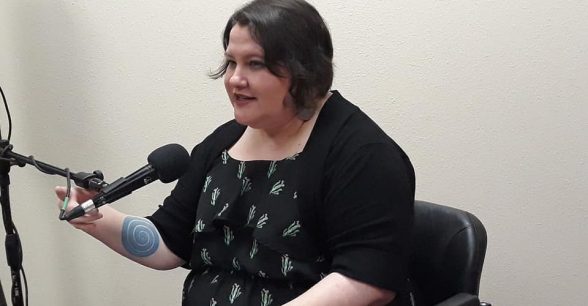Working From Home Levels the Playing Field for Disabled People. Why are Businesses so Intent on Returning to the Office?
I recently went viral on Twitter for sharing how a disabled friend was forced to quit her college back in January because the school wouldn’t allow her to study from home. Just two months later, she watched this exact accommodation made so easily for thousands of others when lockdown happened.
I personally never graduated university. Mental health and disability support at my university wasn’t up to scratch. I ended up skipping classes due to my bad mental health, but my lecturers weren’t understanding at all. I was treated like I was faking to get out of work and infantilized to the point where the head of my program called my mother about my attendance. (I was 25 and didn’t even live with her.) In the end, I failed because I didn’t hand in my year-end assignments. Ultimately, I fell through the cracks.
For the last five years, I’ve worked as a freelance writer because I’ve been told I couldn’t do a staff writer job from home and that I needed to be able to go into the office most of the time. Because I experience chronic fatigue and have a weak immune system, this just wasn’t possible. So you can imagine how upset I was when the pandemic hit and all of these publications boasted that they’d fully equipped all their staff to work safely from home. These same publications have been reluctant to commission my articles about the ableism and double standards that have come to light this past year.
I’m far from the only one who has encountered these issues. Quite simply, pre-pandemic structures didn’t always work for disabled people. My tweets prompted hundreds of replies from people who have had similar experiences of being denied accommodations in educational settings and at work but were now seeing them made so without hesitation.
After being denied flexible working and studying for so long, it was a massive blow for disabled people when it suddenly became manageable on such a large scale. The message was clear: working from home was only a viable option for companies when it affected their profits.
Research from Finder found that two-thirds of UK employers report increased productivity for remote workers compared to in-office workers. Meanwhile in the US, Prodoscore found productivity increased by 47% when working from home. But a report from Timewise, a flexible working consultancy, found that despite working from home being the new normal, the majority of new roles are still advertised as not flexible and would revert back to being office based as soon as possible.
Timewise analyzed 6 million job advertisements and found that 78% made no reference to any type of flexible working options. Of the ones in which remote working was offered as an option, more than half said they would revert to office-based roles once it became possible. But working from home has benefited businesses on the whole, so why, then, are bosses so keen to get back to the old ways?
Working and studying from home has gone some way towards levelling the playing field for disabled people. We can now apply for jobs we typically couldn’t have in the past as they were inaccessible to us. Hours are more flexible and materials are all available and shared online.
The pandemic gave me the push to go full time freelance as it seemed everyone was in the same boat, but when I began applying for freelance editing shifts amidst the confusing changes in the UK lockdown tier system I was once again met with my old enemy: “the role will be from home for now, but you will be expected to work from the office soon,” meaning I was once again excluded from systems that are bragging about how much they are supporting their staff during the pandemic.
Of course, being in a job where you can work from home is a privilege many don’t have. Around the same time as the second wave of the virus started to hit the UK, people started returning to work and disabled people who couldn’t work from home were forced to choose between their livelihoods or their health. As has been the case many times throughout the pandemic, we were offered little support by our government, who initially gave us the “option” of staying at work or quitting and applying for disability benefits.
Disabled people have been among the hardest hit by the pandemic. We’ve already seen our healthcare reduced, our lives put at risk or disregarded entirely, and we’ve essentially been told to lock ourselves away without any further help from the government. In the UK, disabled people accounted for 59% of all Covid-19 deaths from 2 March to 14 July. So, considering disabled people are already 28.6% less likely to be employed in the UK than their nondisabled counterparts, the prospect of something that has benefitted us being taken away once the pandemic is over is devastating.
Companies are outwardly performing inclusion and the spirit that “we’re all in this together,” but it appears they’ll go back to ignoring the needs of disabled people as soon as they can. Society has already failed disabled people enough by not allowing us working from home accommodations in the past. If we go “back to normal” we will be disregarding and failing disabled people all over again.
About Rooted In Rights
Rooted in Rights exists to amplify the perspectives of the disability community. Blog posts and storyteller videos that we publish and content we re-share on social media do not necessarily reflect the opinions or values of Rooted in Rights nor indicate an endorsement of a program or service by Rooted in Rights. We respect and aim to reflect the diversity of opinions and experiences of the disability community. Rooted in Rights seeks to highlight discussions, not direct them. Learn more about Rooted In Rights




Well said!